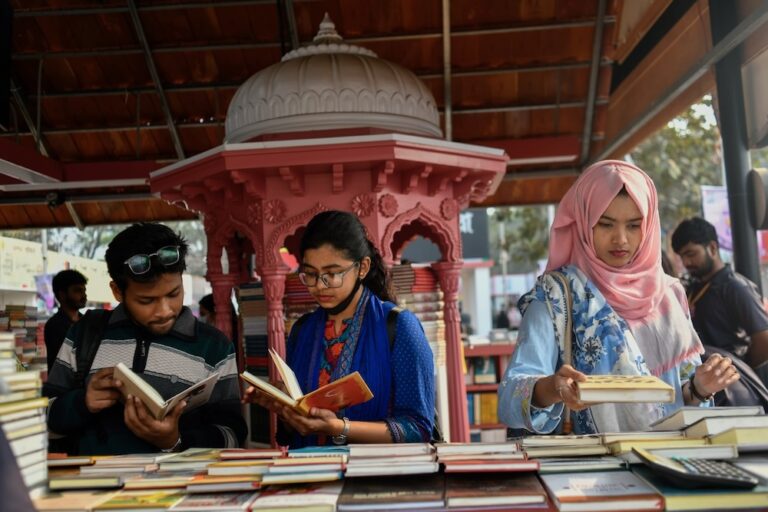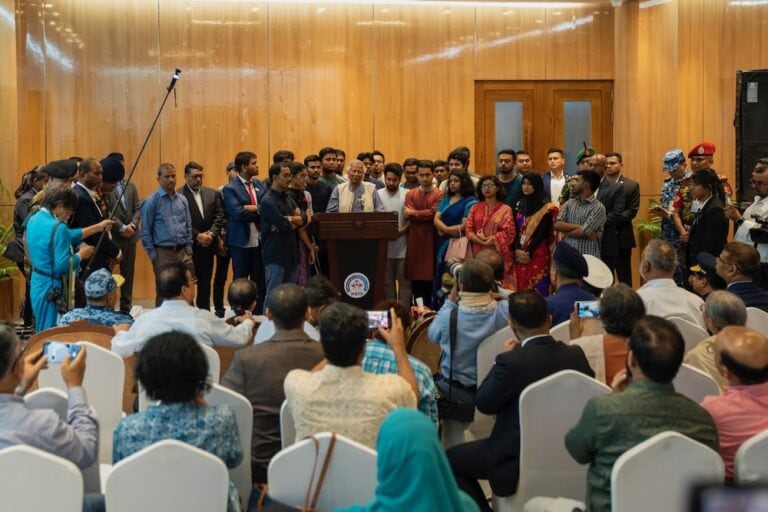(RSF/IFEX) – The following is an RSF letter to Bangladeshi Prime Minister Sheikh Hasina regarding the press freedom situation in the country: Her Excellency Sheikh Hasina Prime Minister Government of the People’s Republic of Bangladesh Dhaka Bangladesh Paris, 29 March 2001 Your Excellency, On several occasions you have expressed your attachment and that of your […]
(RSF/IFEX) – The following is an RSF letter to Bangladeshi Prime Minister Sheikh Hasina regarding the press freedom situation in the country:
Her Excellency Sheikh Hasina
Prime Minister
Government of the People’s Republic of Bangladesh
Dhaka
Bangladesh
Paris, 29 March 2001
Your Excellency,
On several occasions you have expressed your attachment and that of your government to press freedom and the respect for pluralism of information. However, Reporters Sans Frontières and Bangladeshi journalists’ associations can only note, with serious concern, the increasing number of sometimes extremely harsh attacks on journalists and freedom of expression. The impunity that protects the authors of these violations of press freedom and the people behind them is a cause of deep concern to our organisation. As your country enters into an election period, we urge you to put your commitment to press freedom into practice.
The choice of justice, for the moment, has not been made. While government officials, civil servants and local authorities openly display their contempt for the security of journalists and for independent information, it is the duty of the Head of State to clearly draw the lines to follow, in accordance with the democratic commitments of Bangladesh. Two recent events afford you the opportunity to put a stop to this worrying trend and to make fair decisions.
First, we would like to draw your attention to the case of United News of Bangladesh press agency journalist Tipu Sultan, whose hands were broken on 25 January 2001. Several witnesses identified the assailants as henchmen of the ruling party MP in Feni. The journalist also identified the culprits. Despite the seriousness of the attack and the national and international protests, no investigation was carried out and the assailants enjoy full impunity. The journalist, currently hospitalised in Dhaka, has lost the use of his hands. You have given one hundred thousand takas (around 2,000 euros) in compensation to the injured journalist, but do those responsible for this violent act not deserve punishment?
Secondly, inside your government, some officials recently asked for the suspension of BBC news programmes broadcast on the national radio station until one of the editors has been removed from the editorial staff. Some of your supporters accuse Syed Mahmud Ali of participating in the coup d’état in 1975 against the father of Bangladesh, Shiekh Mujibur Rahman. These accusations appear to be a way to attack the BBC, while several testimonies have indicated that they are unfair. A member of your government said that “Mahmud Ali will not work in a neutral wayâ¦since his political affiliations have been unmasked.” Following these accusations, the BBC reiterated its support for Mahmud Ali and said he has never been quoted in any of the official investigations regarding this dramatic event. Such threats against a foreign media journalist are in complete contradiction with the respect for pluralism of information. They are also reminiscent of the methods of former military regimes, especially that of General Ershad, which jailed a BBC correspondent for several weeks in 1989 and banned BBC reporters from entering the country.
We also denounce the constant deterioration of the working conditions of Bangladeshi journalists. Since the beginning of this year, Reporters Sans Frontières has registered 24 assaults on journalists, ten of them by political activists. According to the organisation Bangladesh Human Rights Bureau, 26 journalists have been victims of physical violence. We deeply regret that members of your party, the Awami League, and members of the youth movement linked to it, especially the Chattra League, are behind a large number of these extremely violent attacks. Police have also committed several abusive arrests and violent acts during detention. Recently, on 9 March, police arrested Panthanibas Barua, the Purbokone correspondent in Chittagong, in south-eastern Bangladesh, accused of publishing articles on corruption inside the local police. This journalist is reportedly still detained. In the west of the country, the correspondent of Dainik Bhorer Kagoj in Rajbari was arrested on 26 February following a complaint lodged by the officials of a hospital who felt defamed by articles on corruption in the establishment. The journalist was beaten, splashed with boiling water and forced to sleep in a four-foot wide room. Finally, on 25 February, nine journalists were assaulted by policemen during a press conference organised by students in Tangail, in northern Dhaka. Three of them were hospitalised as a result. In all these cases, we respectfully ask you to take the necessary measures so that the authors of violence against reporters are punished as soon as possible.
Noting that the violence against the media comes from all political sides  the ruling party and the opposition  we suggest that you intervene with the leaders of the most important parties so that concrete solutions can be found to stop this violence. The leaders of the opposition parties must also take their responsibility and order an end to violence against journalists. Reporters Sans Frontières regularly denounces violent acts by supporters of opposition movements such as Chattra Dal and Chattra Shibir, who harass and assault reporters accused of being hostile to their movements.
We remind you that the investigation into the murder of Shamsur Rahman, correspondent for Dainik Janakantha and contributor to the BBC World Service, never reached any conclusion. Yet you and your interior minister personally promised to make all means available to ensure that the culprits were identified and arrested. This murder, which deeply shocked the entire country (tens of thousands of people went to his funeral), could be linked to articles on connections between local Mafia, armed groups and certain journalists. Up until September 2000, two months after the murder, police arrested and interrogated some suspects. Journalists linked to political-Mafia groups were suspected but the exact motives were never established and none of the killers or persons behind the murder are in jail.
Reporters Sans Frontières is also worried about new forms of censorship used by the authorities. On 28 February, the person in charge of the web site www.banglarights.com noticed that the site had been disconnected, only 24 hours after it was launched. The state-owned provider has allegedly cut off this website dedicated to the human rights situation in the country, until an investigation has been carried out. Moreover, in January 2001, the Bangladesh National Museum, under the ministry of culture, tried to censor some pictures of “The war we forgot”, an international exhibition on the Independence War of 1971. According to the authorities, certain pictures showing bodies of pro-Pakistani militia killed by independence fighters could have shocked minors.
On the eve of the June 2001 general elections, we urge you to fully consider the importance of your future decision. Beyond power struggles, this freedom guarantees the democratic future of Bangladesh. We hope to see clear signs of your commitment in this respect in coming weeks.
Thanking you for your attention to our requests,
Yours faithfully,
Robert Ménard
General Secretary
Recommended Action
Send similar appeals to:Her Excellency Sheikh Hasina
Prime Minister
Government of the People’s Republic of Bangladesh
Dhaka, Bangladesh
Fax: +88 02 811 3244Please copy appeals to the source if possible.


